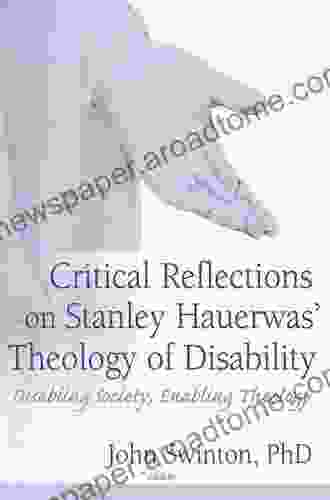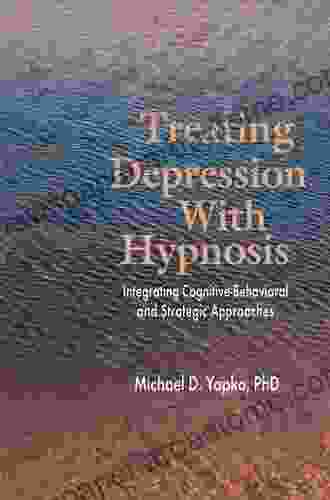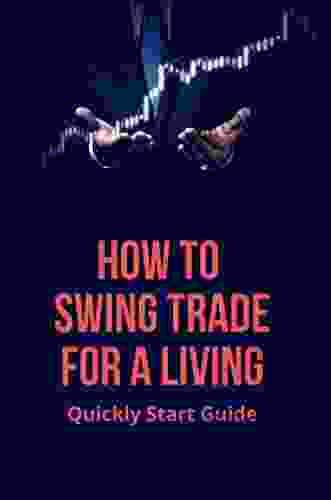Critical Reflections On Stanley Hauerwas Theology Of Disability

: Unveiling the Tapestry of Disability Theology
In the tapestry of theological discourse, the thread of disability weaves a rich and intricate pattern, inviting us to question our preconceived notions of humanity, identity, and the divine. Among the pioneering voices in this field, Stanley Hauerwas stands out as a prophetic scholar whose theology of disability has profoundly shaped contemporary thought on the subject.
Hauerwas' theological tapestry is a vibrant canvas where disability is not merely a medical condition or a social construct, but a fundamental aspect of human existence. He challenges the prevailing narratives that often marginalize and exclude individuals with disabilities, offering a transformative vision that embraces their unique contributions and challenges the very foundations of our social and religious structures.
4 out of 5
| Language | : | English |
| File size | : | 1220 KB |
| Text-to-Speech | : | Enabled |
| Screen Reader | : | Supported |
| Enhanced typesetting | : | Enabled |
| Print length | : | 225 pages |
This article delves into the depths of Hauerwas' theology of disability, exploring its profound insights and challenging perspectives through a collection of critical reflections from renowned scholars in the field. These reflections illuminate the multifaceted nature of Hauerwas' thought, engaging with its theological underpinnings, its implications for disability studies, and its potential to reshape our understanding of human identity, social justice, and the nature of God.
Unraveling Hauerwas' Theological Framework: A Critical Examination
At the heart of Hauerwas' theology of disability lies a radical re-examination of the Christian tradition. He argues that the church's historical treatment of individuals with disabilities has often been marked by exclusion, subordination, and a failure to recognize their inherent dignity. This critique stems from his understanding of the imago Dei, the belief that all human beings are created in the image and likeness of God.
"If we believe that all human beings are created in the image of God," Hauerwas asserts, "then we must also believe that people with disabilities are created in the image of God." This simple yet profound assertion challenges the prevailing notion that disability diminishes one's humanity or divine likeness.
Hauerwas further contends that the church's mission is to embody the love and grace of Christ to all people, regardless of their abilities or disabilities. This mission, he argues, necessitates creating inclusive communities where everyone is welcomed, valued, and empowered to participate fully in the life of the church.
Disability Studies and the Challenge to Hauerwas' Theology
While Hauerwas' theology of disability has gained significant traction, it has also provoked critical engagement from disability studies scholars. Some critics argue that Hauerwas' theological framework, with its emphasis on the imago Dei and the church's mission, may inadvertently perpetuate certain problematic assumptions.
One such critique centers on the potential for Hauerwas' theology to reinforce a dichotomy between "normal" and "disabled" individuals. While Hauerwas rejects the idea that disability diminishes one's humanity, critics argue that his focus on the imago Dei may inadvertently create a hierarchy of value, with those who more fully embody this image being more highly prized.
Another critique stems from the concern that Hauerwas' theology may not fully account for the diverse experiences and perspectives of individuals with disabilities. Disability studies scholars emphasize the importance of listening to the voices of those with lived experiences of disability, ensuring that their perspectives are central to the development of theological frameworks that address their needs and concerns.
Implications for Disability Theory and Social Justice
Despite these critiques, Hauerwas' theology of disability continues to provoke important conversations within disability theory and social justice movements. His emphasis on the inherent dignity of all human beings and the church's responsibility to create inclusive communities resonates deeply with those working to challenge ableism and promote the rights and well-being of individuals with disabilities.
Hauerwas' theology also provides a powerful lens through which to examine the systemic barriers and injustices faced by individuals with disabilities in society. By challenging the prevailing narratives that often marginalize and exclude them, Hauerwas' thought offers a transformative vision of a more just and equitable world where everyone is valued and empowered to live their lives with dignity and purpose.
Reimagining Human Identity and the Nature of God
One of the most profound contributions of Hauerwas' theology of disability is its challenge to our understanding of human identity. By insisting that disability is an essential part of the human condition, Hauerwas disrupts the prevailing notion that normality is the only acceptable measure of human worthiness.
"Disability, like finitude and mortality, is one of the ways in which we are human," Hauerwas writes. "It is not a defect, but a part of what it means to be created in the image of God."
This reimagining of human identity has far-reaching implications for our understanding of the nature of God. Hauerwas argues that God is not a detached, perfect being who is indifferent to human suffering, but rather a God who enters into the messiness and brokenness of the human condition.
"God is not some distant, unmoved mover," Hauerwas asserts. "God is in the midst of our struggles, our pain, our disabilities."
: A Tapestry of Transformation
Stanley Hauerwas' theology of disability is a rich and challenging tapestry that invites us to re-examine our assumptions about human identity, the nature of God, and the mission of the church. Through his radical critique of ableism and his insistence on the inherent dignity of all human beings, Hauerwas provides a transformative vision that has the power to reshape our understanding of ourselves, our communities, and our relationship with the divine.
While Hauerwas' theology is not without its critics, it remains a seminal work that has profoundly influenced the field of disability studies and continues to provoke important conversations about the intersection of theology, disability, and social justice. As we continue to grapple with the complex and multifaceted nature of disability, Hauerwas' tapestry offers a valuable thread with which to weave a more just and inclusive society that embraces the diversity of human experience.
4 out of 5
| Language | : | English |
| File size | : | 1220 KB |
| Text-to-Speech | : | Enabled |
| Screen Reader | : | Supported |
| Enhanced typesetting | : | Enabled |
| Print length | : | 225 pages |
Do you want to contribute by writing guest posts on this blog?
Please contact us and send us a resume of previous articles that you have written.
 Book
Book Novel
Novel Page
Page Chapter
Chapter Text
Text Story
Story Genre
Genre Reader
Reader Library
Library Paperback
Paperback E-book
E-book Magazine
Magazine Newspaper
Newspaper Paragraph
Paragraph Sentence
Sentence Bookmark
Bookmark Shelf
Shelf Glossary
Glossary Bibliography
Bibliography Foreword
Foreword Preface
Preface Synopsis
Synopsis Annotation
Annotation Footnote
Footnote Manuscript
Manuscript Scroll
Scroll Codex
Codex Tome
Tome Bestseller
Bestseller Classics
Classics Library card
Library card Narrative
Narrative Biography
Biography Autobiography
Autobiography Memoir
Memoir Reference
Reference Encyclopedia
Encyclopedia John R Vacca
John R Vacca Jon Mundy
Jon Mundy Joyce O Brien
Joyce O Brien Jonathan Rosenbaum
Jonathan Rosenbaum Jorge E Corredor
Jorge E Corredor Joshua Giles
Joshua Giles Josh Macdonald
Josh Macdonald Lavinia Gomez
Lavinia Gomez Joshua Green
Joshua Green John R Little
John R Little John Mundahl
John Mundahl Sreenivas Alampalli
Sreenivas Alampalli K L Johnson
K L Johnson Lukasz Laniecki
Lukasz Laniecki Joy Connolly
Joy Connolly Joseph Shaules
Joseph Shaules Karel Lewit
Karel Lewit Roberto Villaverde
Roberto Villaverde Joseph P Farrell
Joseph P Farrell Julie Pinborough
Julie Pinborough
Light bulbAdvertise smarter! Our strategic ad space ensures maximum exposure. Reserve your spot today!
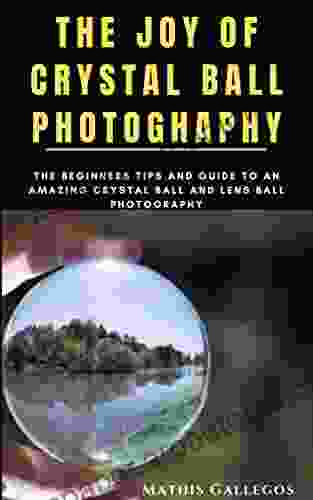
 Raymond ChandlerThe Joy of Crystal Ball Photography: A Photographer's Journey into the Realm...
Raymond ChandlerThe Joy of Crystal Ball Photography: A Photographer's Journey into the Realm...
 Walt WhitmanUnleash the Life-Altering Wisdom of "Lifelong Lessons From Small But Mighty...
Walt WhitmanUnleash the Life-Altering Wisdom of "Lifelong Lessons From Small But Mighty...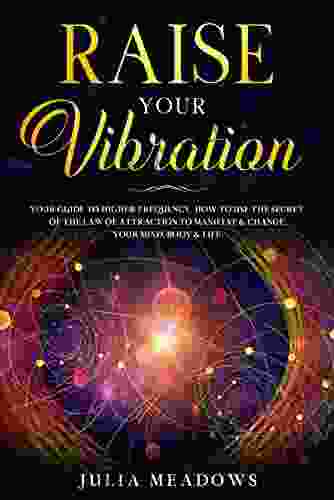
 Manuel ButlerUnlock Your True Potential: Your Guide to Higher Frequency and the Law of...
Manuel ButlerUnlock Your True Potential: Your Guide to Higher Frequency and the Law of... Anton FosterFollow ·3.6k
Anton FosterFollow ·3.6k Jordan BlairFollow ·2.7k
Jordan BlairFollow ·2.7k Arthur MasonFollow ·7.6k
Arthur MasonFollow ·7.6k Mark MitchellFollow ·13.1k
Mark MitchellFollow ·13.1k George R.R. MartinFollow ·7.1k
George R.R. MartinFollow ·7.1k Chase MorrisFollow ·18.8k
Chase MorrisFollow ·18.8k Barry BryantFollow ·9.4k
Barry BryantFollow ·9.4k Ian PowellFollow ·3.9k
Ian PowellFollow ·3.9k
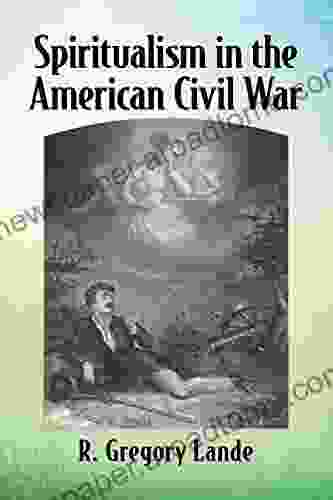
 Sidney Cox
Sidney CoxSpiritualism in the American Civil War
An Unseen Force in the...

 Robbie Carter
Robbie CarterEmpowering Healthcare Professionals: Discover the...
Welcome to the world of...

 Virginia Woolf
Virginia WoolfUnveil the Secrets of Nature's Healing Scents: "Growing...
Embark on an aromatic journey...
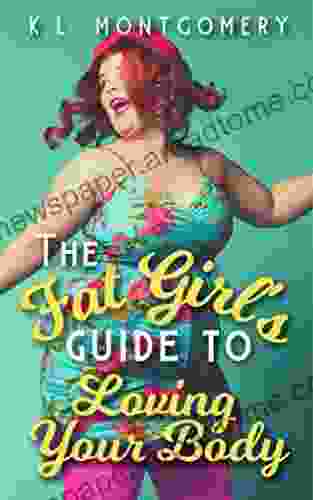
 Martin Cox
Martin CoxThe Fat Girl's Guide to Loving Your Body: Empowering...
Alt attribute: Confident plus-size woman...
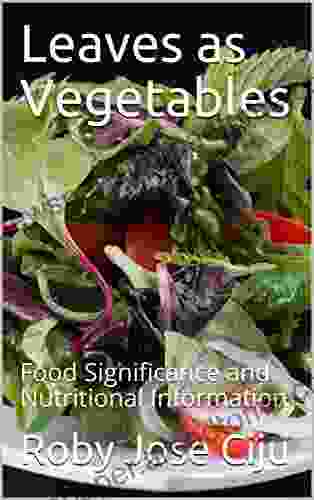
 Graham Blair
Graham BlairUnlock the Secrets of Vegetables: Their Nutritional Power...
In the realm of culinary delights and...
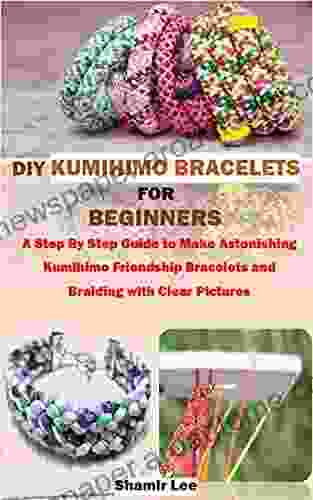
 H.G. Wells
H.G. WellsStep-by-Step Guide to Crafting Astonishing Kumihimo...
Are you ready to embark on a captivating...
4 out of 5
| Language | : | English |
| File size | : | 1220 KB |
| Text-to-Speech | : | Enabled |
| Screen Reader | : | Supported |
| Enhanced typesetting | : | Enabled |
| Print length | : | 225 pages |


